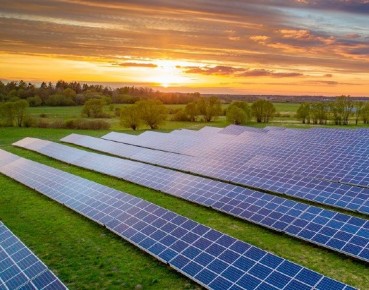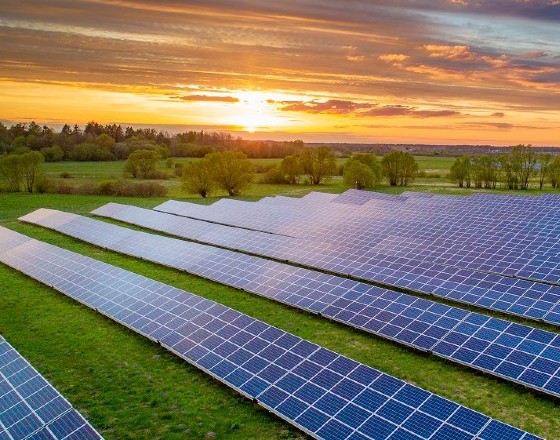Tydzień w gospodarce
Category: Raporty

(Columbus Energy, Public domain)
With an average nominal capacity for each plant of less or equal than 1 MW, the total capacity will reach about 65,6 MW. This is the equivalent of 19,000 households, which could be supplied with the energy generated by the project. The operation has the guarantee of the European Fund for Strategic Investments (EFSI), which is the financial pillar of the Investment Plan for Europe jointly managed by the European Commission and the EIB. The EIB is co-financing the project with DNB Bank Polska, each bank providing 50 per cent of senior debt. Energy Solar Projekty will put around 30 per cent of total funding needs of the project.
The PV plants are located in northern Poland, covering areas in the Voivodships of West Pomerania, Pomerania, Warmia-Masuria and Kuyavia-Pomerania, with a larger conglomeration in the first three regions. The PV plants are grouped in eight project companies, each comprising of one or more individual plants.
The total capacity of all newly built independent PV plants will produce approximately 68,000 MWh of electricity in the first year and will help to reduce 47,000 tons of carbon dioxide each year. It is estimated that the total installed capacity of all solar power plants in Poland has reached around 1.3 GW in the end of 2019. “This is excellent news both for Poland’s economy and its environment. The European Green Deal will be at the heart of our efforts to rebuild our economies after the coronavirus pandemic and Poland should continue to make use of all the EU support on offer,” said European Commissioner for the Economy, Paolo Gentiloni.
“We welcome the EIB’s first ever financing of a solar energy project in Poland”, said prof. Teresa Czerwińska, EIB Vice-President. “Photovoltaics play a role in the decarbonization of the energy sector and are a fast-growing industry in many countries. Poland is no exception. The auction system introduced by the government has generated a lot of interest from domestic and international investors, as shown here by the Lithuanian company Lords LB Asset Management. This is the first concrete project financed by the EIB under a program loan dedicated to solar energy in Poland and approved in 2018. We hope more will come to life in the near future”.
The overall EIB financing made available under the 2018 program loan for solar energy projects in Poland amounts to EUR100m. The program loan supports land-based small and medium-sized PV plants, enjoying revenue protection support against price fluctuations, awarded under the renewable energy auctions held in the country. The program supports the EU and Poland’s national targets for renewable energy generation and will help to reduce global greenhouse gas emissions.
The European Bank for Reconstruction and Development (EBRD) said it would support French renewable energy producer Qair’s portfolio of almost 200 MW of renewable energy in Poland with five loans totaling EUR63m, advancing the green energy transition in Poland. BNP Paribas is also providing project finance lending to the portfolio on a parallel basis.
According to the EBRD, the portfolio includes the construction under the Polish renewable energy auction support scheme (contract for difference) of 93 MW of new capacity — the three wind farms Udanin (50 MW), Parzeczew (9 MW) and Wrzesnia (9 MW) and 25 MW of solar photovoltaic — as well as the operation of wind farms Linowo (58 MW) and Rzepin (48 MW).
The EBRD said its loans will be provided to five Polish SPVs that are ultimately owned by two experienced sponsors — the French renewable energy developer and operator Qair and the French infrastructure fund RGreen Invest.
“While so many efforts are rightly focused on addressing the COVID-19 crisis, it is also vital to sustain the momentum behind the green transition,” said the director of EBRD’s Energy EMEA team, Harry Boyd-Carpenter. “Climate change may now feel less immediate, but it is every bit as serious a challenge. By providing long-term finance under the current circumstances, the EBRD is making a significant contribution to Poland’s energy transition and demonstrating its commitments to its partners and strategic goals. We are delighted to engage for the first time with such strong partners as Qair and RGreen Invest in this,” he added. The EBRD said supporting Poland’s green transition with investments in renewable energy and energy efficiency remains one of its priorities in the country.
Poland, which still generates 80 per cent of its energy from coal, has committed itself to the EU climate and energy targets for 2030, which include a reduction of at least 40 per cent in greenhouse gas emissions. Renewable energy has a key role to play in meeting that goal.
Poland surpassed 1.83 GW of solar power generation capacity at the end of April, according to data available to the transmission system operator. PSE said that the photovoltaic (PV) capacity in May stood at 1,832.7 MW. This is an increase of 8.1 per cent, or roughly 137 MW, from April. Solar capacity has almost trebled in one year, as it was 651 MW in May 2019. Poland reached its first solar gigawatt in the autumn of 2019, mainly thanks to micro installations like rooftop solar systems. The country is expected to surpass 2 GW of solar capacity this year.


